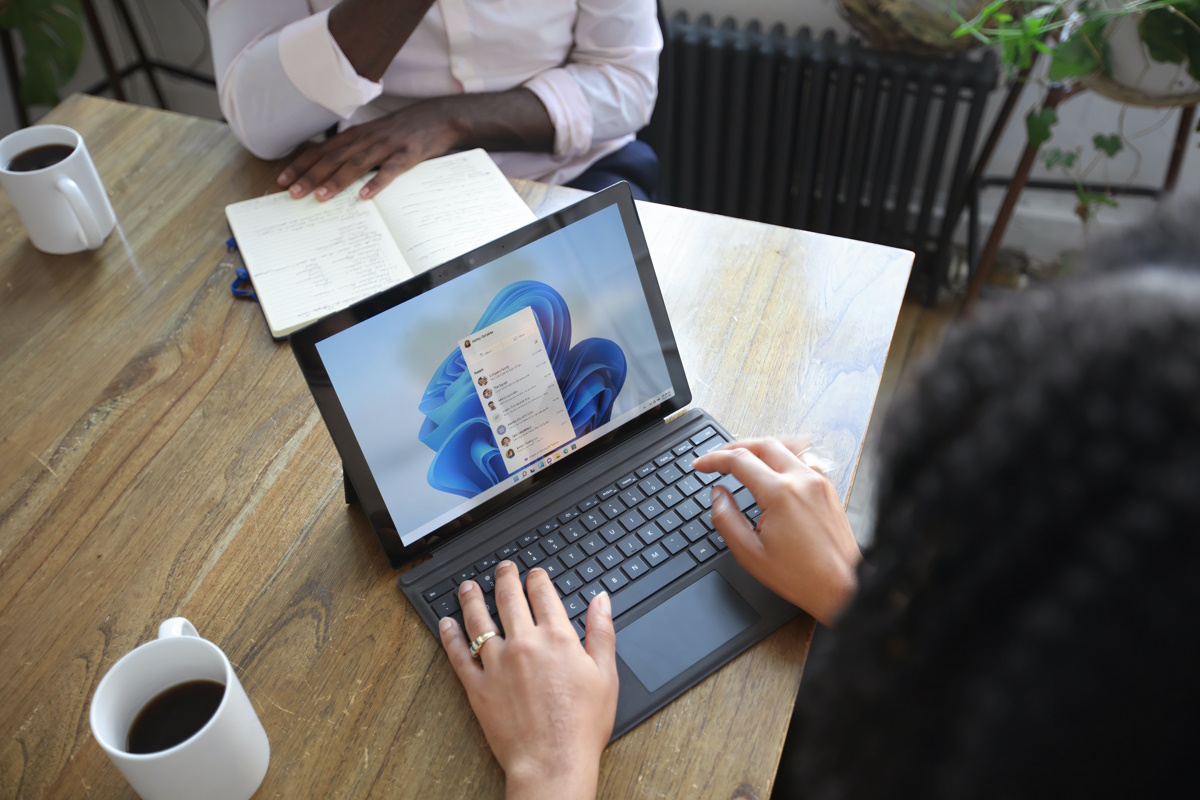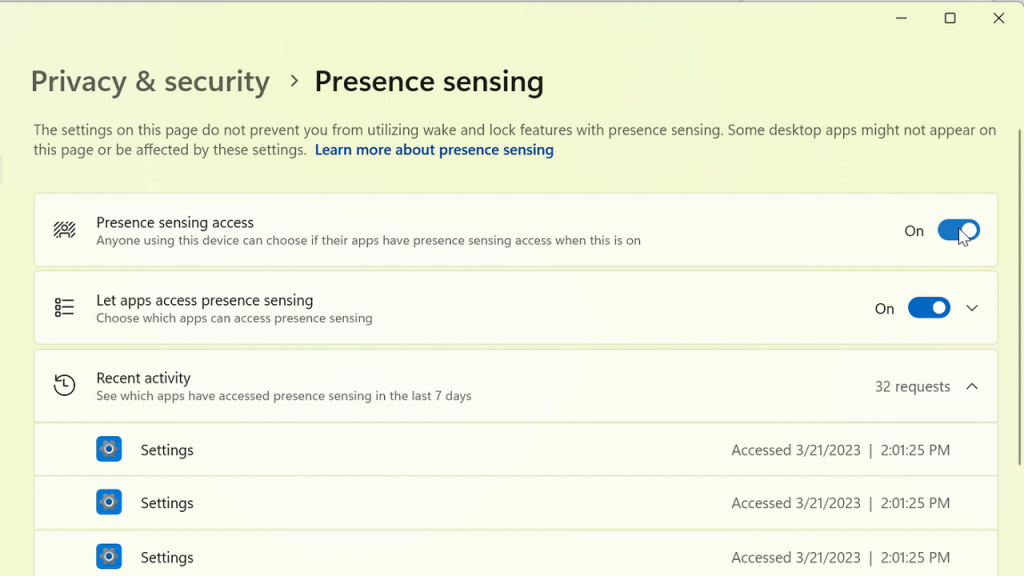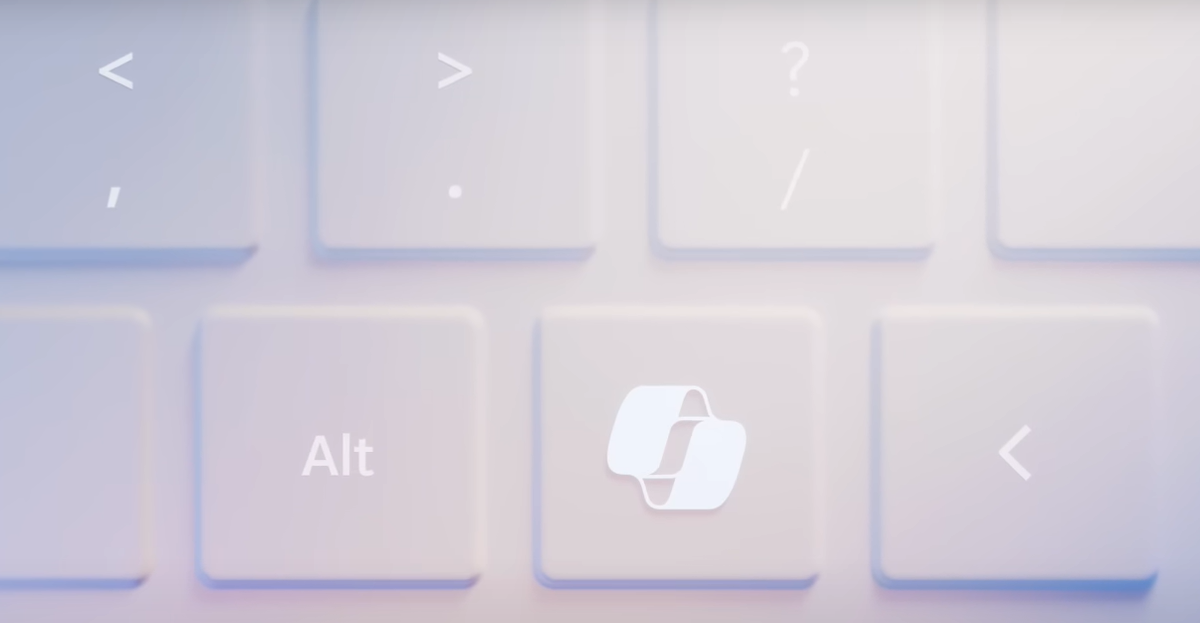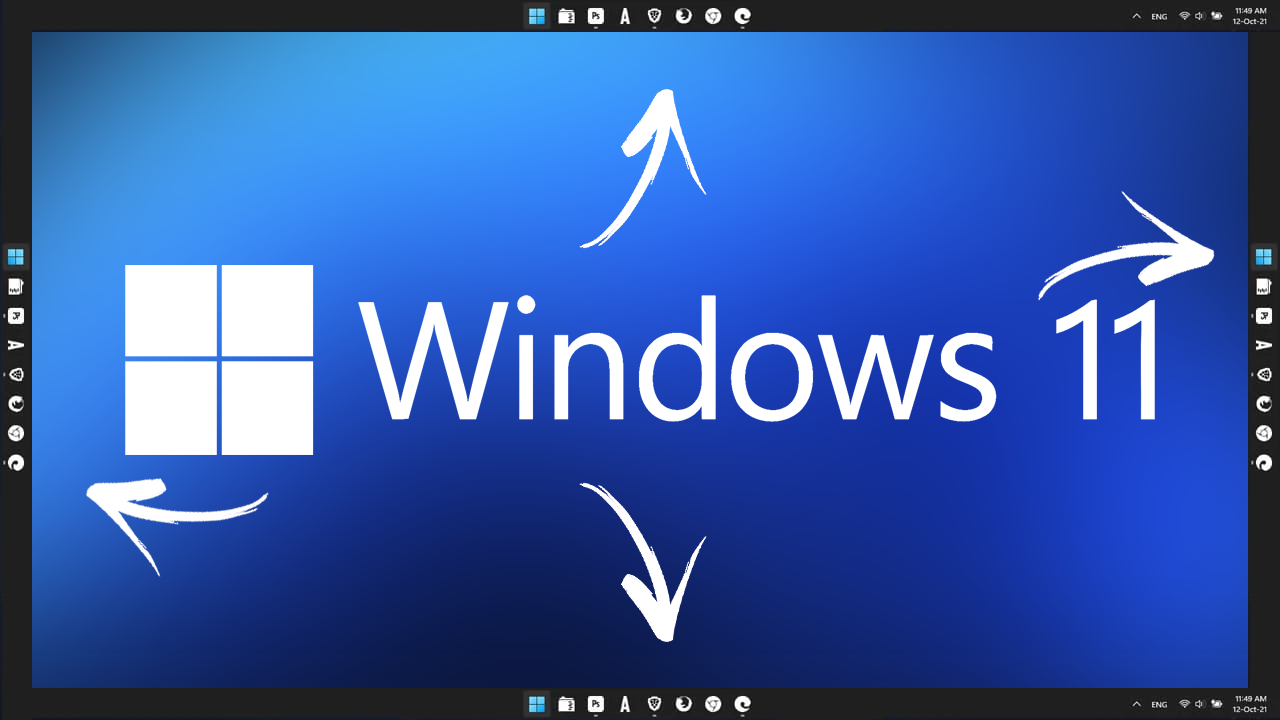Windows 11 is getting Presence Sensing privacy settings

Microsoft is working on integrating Presence Sensing privacy settings and APIs to its Windows 11 operating system. Presence Sensing makes use of sensors that determine whether a user is near a device. This sensing activity may lead to automatic actions, such as locking the device when the user's presence is no longer detected, or to wake a PC when a user is coming inside the sensor's detection radius.
Soon, Windows 11 users may have control over the Presence sensing capabilities of their devices. Microsoft launched a new privacy setting and API in the Insider Preview build 22624.1610, which it released just a moment ago.
Windows 11 users who install the build on devices with presence sensing capabilities may open Settings > Privacy & security > Presence sensing to control the functionality.
There, they find several options, including one to disable Presence sensing access for all users of the device or for apps that are installed on the device.
The two options give users control over the feature. Toggling them off disables the functionality on the device. It is unclear at this point if certain core operating system features continue to have access to Presence sensing after users turn the feature off.
The Presence sensing Settings page lists recent activity as well on the page; this is useful to check which apps have accessed the functionality on the device in the past. The listing is limited to activity of the past seven days, and lists access chronologically.
Each app is listed with its name, access date and time under recent activity.
Microsoft notes on the Windows blog that it is not collecting any images or metadata, and that all processing "is done locally on the device hardware to maximize privacy".
Application developers may use the newly created API to integrate presence sensing capabilities into their applications. Microsoft notes: "App developers with devices with compatible presence sensors can target apps to request and read user presence information after requesting a human presence capability."
The main API page is available here. It lists technical information, but also additional information. For users, the following information may be relevant also:
- Presence sensing may have a "significant impact" on security, responsiveness and performance.
- Devices may be locked automatically when left unattended "to protect sensitive files and other info".
- Developers may infer user intent to "reduce the response time required from detection to authentication or interaction".
- Devices on battery may last longer by "reducing unnecessary screen idle time".
Soon, privacy apps and policies will be available to manage the feature as well.
Now You: what is your opinion on presence sensing?






















It would have been informative to explain what a “presence sensor” even is. I first suspected the use of standard hardware like the computer webcam but a quick search suggests it’s maybe instead about rare, dedicated peripherals, or I hope so. Then the privacy idiocy of telling Microsoft and the gang where people are in the room (possibly without even them knowing they are being tracked) wouldn’t be the problem of every single user. Until they start bundling those sensors in every device, “for security”…
softwashing just creates more stupid users -> at the end you get exactly what you wanted to avoid.
and win11 and privacy is an oxymoron first hand. whos protecting the users from microsoft? maybe someone asks that.
How long before Presence Sensing makes it on to the list of products killed by Microsoft: https://killedbymicrosoft.info/
Can’t wait for the day when they start sensing how many times a day we wipe our butts so they can sell us some wipe that is tailored to our interests and sexuality.
You are funny man. Can you imagine starting ChatGPT session.
ChatGPT: “Hey, did you forget to order butt wipes?”.
You: “Hello?”
ChatGPT: “Since I am sharing your personal information with Microsoft, I know that you don’t wipe your butt regularly”.
You: “Thanks. I will order some in Microsoft Store.”
More useless crap instead of fixing things that are broken.
So given my pc is in a high traffic area every time someone walks past it will wake up or because it’s a high traffic area it may never go to sleep?
Sounds like surveillance to me. Nothing to do with privacy. I’m glad I’ve avoided Windows 11
Microsoft seem to be struggling to find ways to stay relevant… nah actually, they are finding new ways to track everything you do.
Under Satya, Windows has devolved into a subpar fraudulent OS. Everyone responsible for deciding on Windows 11 features needs to be terminated. Windows 11 has a lot of spyware and monitoring features. At all times, it communicates with Microsoft servers. Go to your Microsoft account to obtain a thorough breakdown of the programs and websites you have accessed and the time stamps. Microsoft recently issued customers an email when Windows Defender was disabled. For you to rent their flawed OS on a monthly basis on the cloud, they are now promoting Windows 365. The OS and your data are now completely in their hands. Scary, I tell you.
The PC can’t wake for an alarm you set in the alarm clock app but it can wake when you come near it?
It will probably not work in Sleep mode. In regular state through Bluetooth it could sense movement of smartphones and smartwatches. That would be my guess.
Anybody noticed that recently only Martin’s articles have comments? Everybody adjusted their rss feeds to skip freelancers?
I look at the others on the web page, but I don’t know anything about iPhones or Tiktok or Twitter or xbox or Snapchat orFfacebook or chatGPT, so I typically have no comment on all those other articles.
When a ton of things are still missing from the downgrade from 10 to 11, more useless features are added. A useful taskbar, where is it? Why does the start menu still not allow customization? Why does the right click menu still serve no purpose over the previous one?
A computer that monitors your every move. And they are calling this a privacy setting. In fact, it’s pretty much the exact opposite of privacy. It’s surveillance.
I am sure that new updates of privacy software (like O&OShutup and others) will include this function in their “disable”/”enable” settings. Who could track all that surveillance garbage what Microsoft will come up with?
So face recognition, or just body presence to unlock? Big differace between the two. Also what increase of required system specs to have all these thing on and constantly monitoring your presence.
Serms to me that this is a solution to someting that is not a problem.
Nothing really private about Windows 11.
Same goes for 10, 8 and the list goes on. Yesterday, after using Windows 11 since it was in beta in summer 2021, I finally decided to roll back to Windows 10, it’s faster and so much better, I mean less worse.
At work we sometimes get people who are incapable of basic security (until they are taught the lesson when they wander away leaving their computer awake). In other words, while the function may not be necessary for some people, in a work environment it needs to be implemented by group Policy.
Useless and insecure settings inmho.